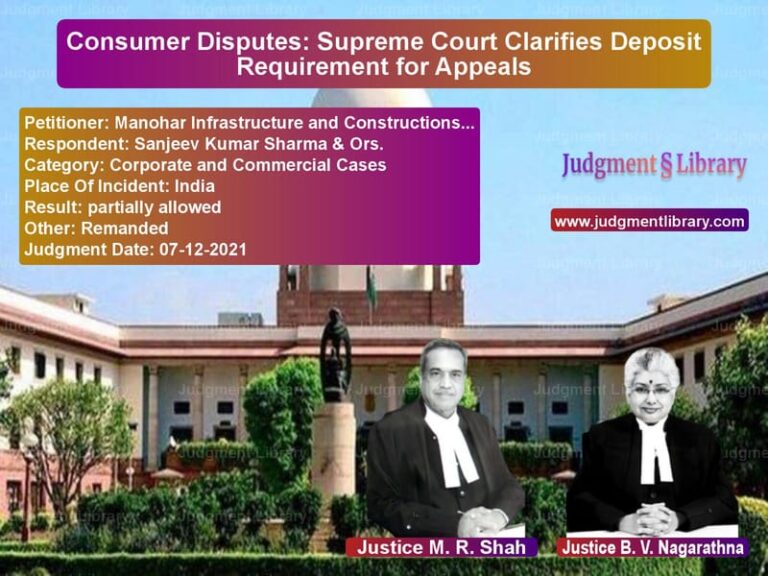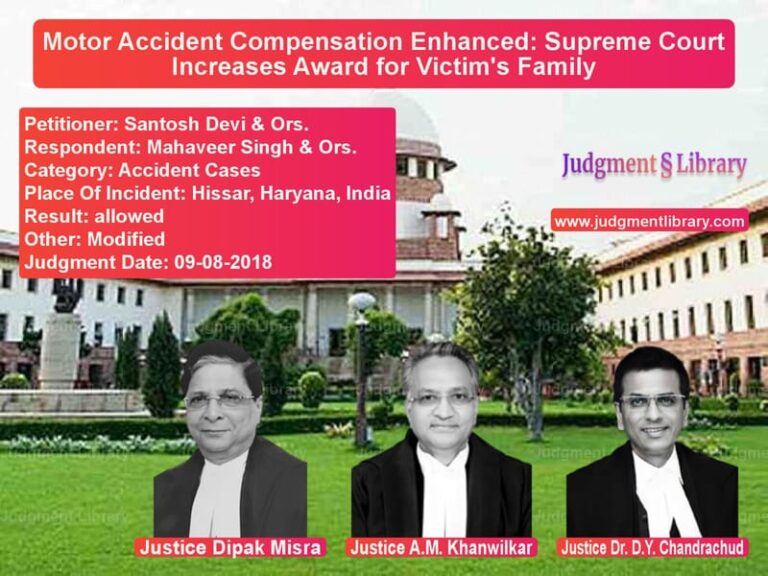Supreme Court Rules on Interest Calculation in Arbitration Award Enforcement
The Supreme Court of India recently ruled in the case of Nepa Limited vs. Manoj Kumar Agrawal, addressing the computation of interest on an arbitration award under the Arbitration and Conciliation Act, 1996. The dispute revolved around whether interest on the awarded amount should be calculated based on the entire principal sum or only on the remaining principal after partial payments.
The Court set aside the Madhya Pradesh High Court’s decision, which had directed Nepa Limited to pay interest at 18% per annum on the entire awarded amount until the final disposal of the appeal under Section 37 of the Arbitration Act. The Supreme Court clarified that once a portion of the amount is paid, interest should only be charged on the remaining principal and not on the paid portion.
Background of the Case
The dispute arose over an arbitration award that directed Nepa Limited to pay Rs. 14,49,300 to Manoj Kumar Agrawal as a refund of the balance security deposit under a contractual agreement dated 25.10.1996.
The key timeline of events was as follows:
- April 14, 2000: The arbitration award was passed, directing Nepa Limited to pay Rs. 14,49,300 with 18% interest per annum until payment.
- February 28, 2001: Nepa Limited’s objections under Section 34 of the Arbitration Act were dismissed.
- October 30, 2001: The Division Bench of the High Court stayed execution proceedings upon Nepa Limited depositing 50% of the awarded amount.
- November 5, 2001: Nepa Limited deposited Rs. 7,78,280.
- November 8, 2001: Manoj Kumar Agrawal withdrew Rs. 7,78,280 after furnishing a personal undertaking.
- February 2, 2012: The Division Bench dismissed Nepa Limited’s appeal under Section 37 of the Arbitration Act.
- August 1, 2012: Agrawal filed an application for recovery of Rs. 3,97,382 along with interest.
- June 19, 2017: The Madhya Pradesh High Court ruled that interest should be calculated on the entire principal amount (Rs. 14,49,300) until the final disposal of the appeal.
- December 8, 2022: The Supreme Court overturned the High Court’s decision.
Arguments by the Appellant (Nepa Limited)
Nepa Limited argued:
- Interest should only be charged on the outstanding principal, not on the amount already paid.
- The High Court erroneously applied interest on the full awarded amount despite partial payments.
- Since Rs. 7,78,280 was withdrawn in 2001, interest should cease on that amount from the withdrawal date.
Arguments by the Respondent (Manoj Kumar Agrawal)
Manoj Kumar Agrawal countered:
- The award directed interest at 18% per annum until full payment, and partial payments do not affect this.
- As per Order XXI Rule 1 CPC, Nepa Limited did not serve a notice of deposit, and thus interest should continue on the entire principal amount.
- The High Court correctly applied the interest calculation method.
Supreme Court’s Judgment
The Supreme Court ruled in favor of Nepa Limited and held:
- Interest should only apply to the outstanding principal amount, not the paid portion.
- “Once an amount is withdrawn, interest liability should cease on that portion.”
- The High Court misinterpreted Order XXI Rule 1 CPC, as the withdrawal itself acts as notice to the decree holder.
- Interest should be recalculated based on the remaining principal after adjusting the payments made.
Key Precedents Cited
The Supreme Court referred to multiple landmark cases:
- Gurpreet Singh vs. Union of India (2006): Held that once a decree holder withdraws deposited money, interest ceases to run on that portion.
- Raunaq International Ltd. vs. IVR Construction Ltd. (1999): Stated that parties benefiting from interim orders should bear financial consequences.
- State of Rajasthan vs. J.K.S. Synthetics Ltd. (2011): Clarified that interest applies only to unpaid amounts.
Impact of the Judgment
This Supreme Court ruling has significant implications:
- Prevents excess interest payments: Ensures that interest is calculated only on outstanding amounts.
- Clarifies enforcement of arbitration awards: Confirms that withdrawals affect interest calculations.
- Restricts misuse of Order XXI Rule 1 CPC: Prevents decree holders from unfairly claiming interest on paid portions.
Conclusion
The Supreme Court’s ruling in Nepa Limited vs. Manoj Kumar Agrawal ensures fair interest calculations in arbitration award enforcement. The judgment prevents excessive financial liability on judgment debtors while upholding the rights of decree holders to claim legitimate interest.
The verdict sets an important precedent for arbitration award executions, ensuring interest calculations align with actual financial transactions.
Petitioner Name: Nepa Limited.Respondent Name: Manoj Kumar Agrawal.Judgment By: Justice Sanjiv Khanna, Justice Sudhanshu Dhulia.Place Of Incident: Madhya Pradesh.Judgment Date: 08-12-2022.
Don’t miss out on the full details! Download the complete judgment in PDF format below and gain valuable insights instantly!
Download Judgment: nepa-limited-vs-manoj-kumar-agrawal-supreme-court-of-india-judgment-dated-08-12-2022.pdf
Directly Download Judgment: Directly download this Judgment
See all petitions in Arbitration Awards
See all petitions in Enforcement of Awards
See all petitions in Judgment by Sanjiv Khanna
See all petitions in Judgment by Sudhanshu Dhulia
See all petitions in allowed
See all petitions in Modified
See all petitions in supreme court of India judgments December 2022
See all petitions in 2022 judgments
See all posts in Arbitration and Alternate Dispute Resolution Category
See all allowed petitions in Arbitration and Alternate Dispute Resolution Category
See all Dismissed petitions in Arbitration and Alternate Dispute Resolution Category
See all partially allowed petitions in Arbitration and Alternate Dispute Resolution Category







